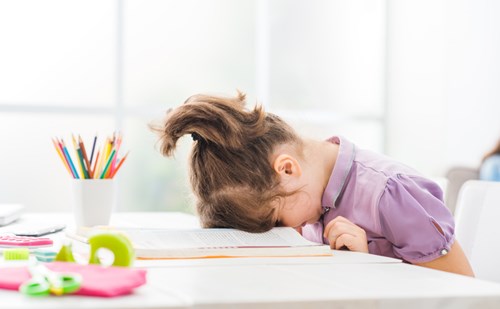Stress In Children And 5 Ways To Help Them Out
Many parents often wonder how it is possible for a tiny person to get stressed. Experts say children like adults can experience stress at any age of their lives.
Stress is a feeling of emotional or physical tension that can be triggered from an event or a thought that makes you feel frustrated, angry, or nervous. It is actually a normal reaction of a person's organism when they feel that they do not have the appropriate skills/means to adequately respond to any demands of the environment, and in short bursts, stress can be positive (like when it helps us avoid danger or meet a deadline). But when stress lasts for a long time, it may harm our health.
What can cause stress in children?
Many factors and events in a child's life can create stress. Children's school or social environment may create pressure that they find difficult to manage. Also, events where a child's life changes, such as
- Divorce
- Loss of a close person
- Moving to a new place or a different house
Are just a few factors that can create stress for a child. Stress in children can also appear if a parent gets stressed. But the greatest danger for children is the modern way of life.
According to the American Psychological Association's annual survey, teenagers today are just as stressed as adults but even young children are more stressed than we think.
"Is my child stressed?"

Stress in children is often difficult to detect. Children usually externalise the stress they feel. Childhood stress often presents with a physical symptom. A child might report feeling unwell, or have frequent headaches and stomachaches (assuming anything pathological has been ruled out by their doctor), or maybe these symptoms worsen on certain occasions (e.g. before an exam), this means that the child may be experiencing stress. Other times stress can bring about negative changes in the child's behavior. Common symptoms of stress in children to look out for are:
-
Frequent headache, stomachache (without pathological cause)
-
Nightmares
-
Sleep Disorders
-
Isolation and withdrawal from friends
-
Refraining from daily activities
-
Nervous habits such as biting one's nails, playing with one's hair or pulling them
5 Useful tips to protect your child from stress

-
Don't overload their schedule.
Let children have time to play, time to dream, time to create, and even time to be bored. Children need to understand that life is not only about the activities that fill-up time. These moments are very important for their emotional and mental development also.
-
Take your time!
It's nice to feel creative and excited, but stress is counterintuitive sometimes. Slow-down during activities and between errands, without being in such a hurry. Children will feel your presence more "centered" and will follow your example.
-
Encourage your child to achieve without pressuring for a 'win'.
Encourage your child to be creative with any hobby, talent, or skill that is important to them. Don't put pressure for a “win”, just let them have fun.
-
More nature, less screens.
Children need more contact with nature and less screen time. Nature helps children unwind, relax, and positively affects their physiology. Maybe taking your child to the cinema, or watching a movie together is easier, but try to prefer activities outside and in nature, an adventure, like hiking, a bike ride or even a visit to a museum.
-
Listen, play, laugh!
Like adults, children need opportunities to talk, be heard and laugh. Laughter helps children decompress from the normal stress of everyday life. Find time to chat with your child about their day. Connect with your child. Just by being there you make them feel safe and less stressed about everything.
Related Articles
Bedtime routines for children of all ages
Top 5 Museums Around Zurich for Kids And Their Role In Children's Development
Top 5 Family Restaurants in Luzern
Top Books for Kids' Summer Reading
What to look for in children's foreign language classes
Are Language Learning Apps Really Effective?
Top 4 Language Apps for Kids and Teens
Why Kids Need to Code. Plus Everything You Need to Know As A Parent
8 Effective Tips for Raising Teens
Tips to help children eat more vegetables
Teaching Responsibility
The top list with the greatest birthday party ideas for kids and teens
How to keep children safe online
What You Need to Know About Sustainable Fashion for Kids
How to explain to kids about the circular economy?
10 Reasons to Go Hiking with Your Kids
Why are summer camps good for our children. Plus The Best Summer Camps in Zurich This Summer
Financial Education for Children
Tips for Getting Outside with Older Children
FREE Educational Activities for Kids in Zurich
Why are bedtime stories good for our children
Tips for an Overnight Stay in Mountain Huts in Switzerland
10 Tips for Organising a Hassle-Free Birthday Party for Kids
Is Art Camp Good for Kids? The answer is Yes!
3 Things that an active 6-year old enjoys doing after school
Perfect Farms around Zurich for Birthday Party
The Best Trampoline Parks Around Zurich
8 Tips for Great Family Photos with a Smartphone
6 Insider Tips for a Day in Bern with Kids
Tips on self-development while parenting
Ski and Snowboard Safety Gear for Kids
10 reasons to learn a foreign language!
7 Tips on how to be a parent and a life-long learner at the same time
Staying Healthy this Winter
Choosing the right hiking boots
Camping with Kids
Sign up here to hear more from us!
